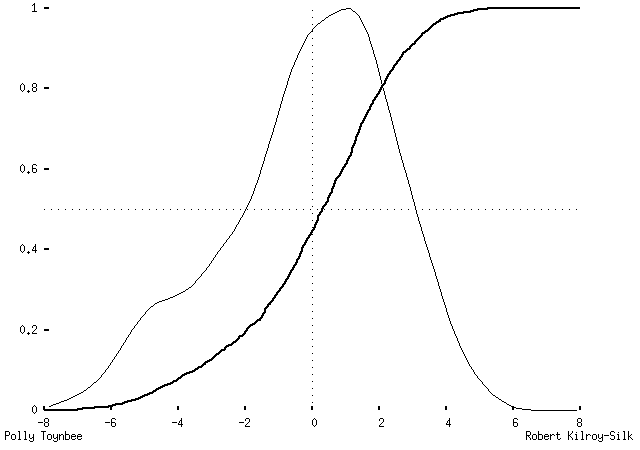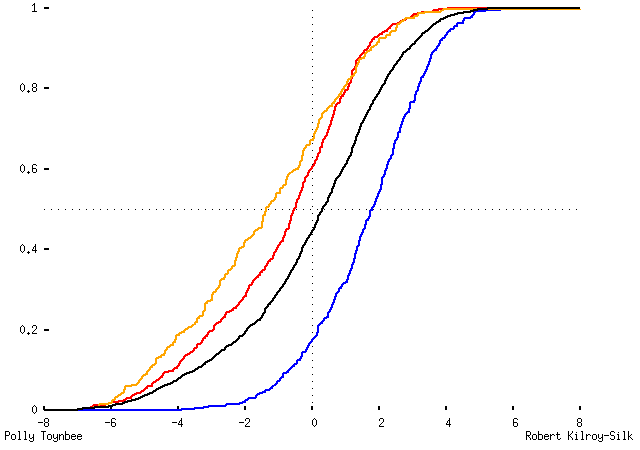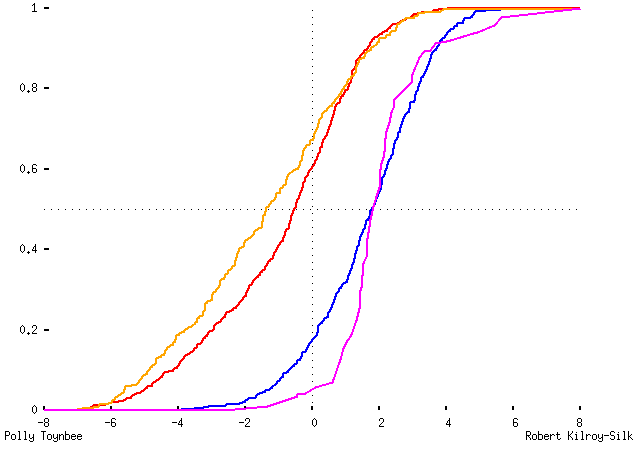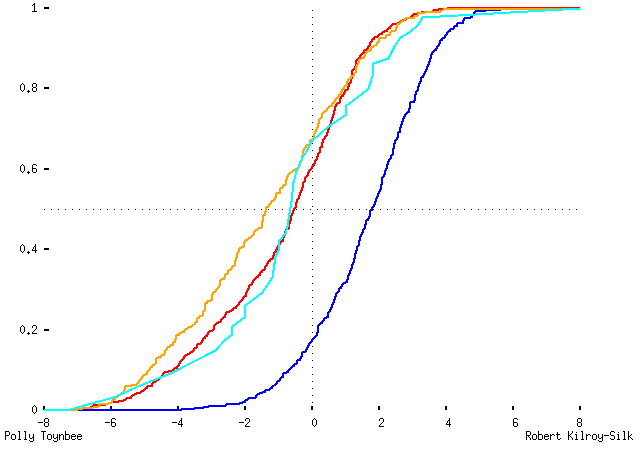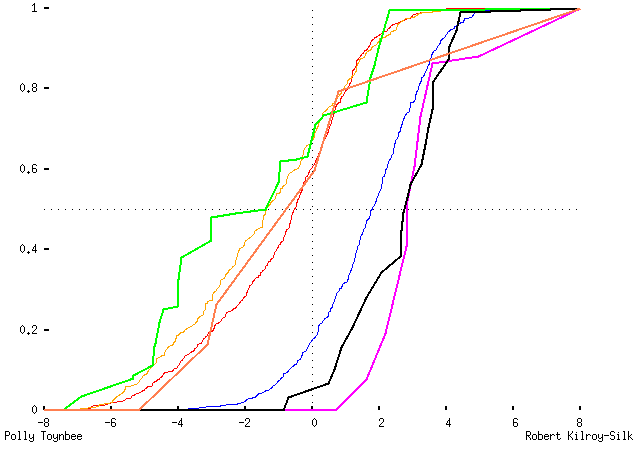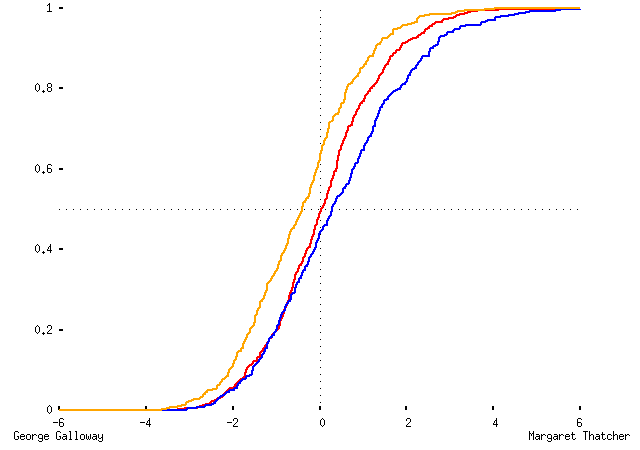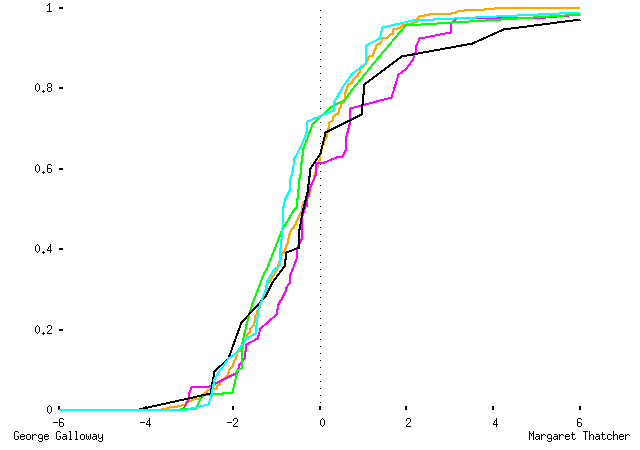Some of my half-dozen readers may have seen this piece by Peter Kellner in last Sunday's Sunday Times, referring in part to an opinion poll which YouGov did at the beginning of March. The aim of this was to apply the process used in my on-line political survey to a balanced sample of the British population, to discover the axes which best describe Britons' political beliefs.
YouGov have very kindly allowed me to make use of the data from the poll. (Many thanks also to Tom Steinberg, who collaborated in this work.) Hopefully this is the sort of thing which some of you find interesting; there's quite a lot to say, and this is just a very brief summary.
To start with, you can answer the questions in the poll at, http://www.politicalsurvey2005.com/ and see how your views compare with the rest of the British population. Then read on....
As before, the idea here is to present respondents with a bunch of statements -- we used 32 in total -- and ask them the extent to which they agree or disagree with them. Some examples:
- `I am comfortable with the way that genetic engineering is being used in the food industry';
- `To get extra police on the beat, we should allow more suitably trained foreign police officers to move to the UK';
- `Prisons are too soft on criminals'.
Now we can look for the combinations of statements which maximise the variance in the population. These combinations correspond to axes of belief along which the population is most spread out. Once we have the axes, people's political views can be summarised by numbers which give their positions on those axes, and compared to the views of other members of the population.
So, how does this turn out? Principal Components Analysis gives us as many axes as we put in variables -- in this case, respondents' answers to the questions. But only some of these axes are statistically significant; in this case we find two, of which the first is very significant and the second of only marginal significance.
The most important ten statements on the first axis are these:
-- a person who agrees or disagrees with each of those statements in the sense given will end up at one end of the axis (we, arbitrarily, made this the positive end); a person whose views are the opposite will end up at the other end. Slightly facetiously we refer to this as the `Axis of UKIP': the extremal positive views are those of people who are Eurosceptic, believe in capital punishment and harsh prison régimes, and oppose immigration. At the other end of the axis people believe in further European integration, the primacy of international law, the benefits of immigration, and so forth.
This axis is identifiably left/right -- people at large positive positions are definitely `right wing' -- but it is not the traditional left/right axis of economics and class division.
Here's how the British population as a whole is distributed on this first axis:
(The thicker line is the cumulative distribution, measured against the vertical axis; read it as `the fraction of people to the left of this point'. The people named at each end of the axis are plausible stereotypes to whom you might ascribe the extremal views on that axis, but note that I'm not making a statement about their actual positions!)
Note that the tail of more internationalist people on the left is much bigger than the tail of more isolationist people on the right. I'm not sure why that is, but it may be because to push yourself very far to the right you have to agree to quite a lot of quite offensive things. And perhaps rehabilitationist/internationalist extremism looks less offensive than rightish extremism anyway.
Here's how people who said -- in early March, but the polls haven't moved that much since then -- they'd vote for each of the major parties show up on the first axis, compared to the whole population:
- Labour are left-of-centre;
- the Tories are right-of-centre;
- the Lib Dems are more spread out than Labour voters, but basically overlap completely with them;
- in the center, voters for all three parties are mixed up together.
On values, everyone is a swing voter now.
If it's the axis of UKIP, you might ask, where is UKIP? Here:
Observe that the median UKIP voter is in almost exactly the same place as the median Tory. Core UKIP voters look just like core Tory voters, and they have the same beliefs about Europe, capital punishment and immigration which Tory voters do. And, with curious symmetry, Welsh and Scottish Nationalist voters show roughly the same relationship to Labour voters as do UKIP to Tories:
Greens and non-UKIP nutters -- black is BNP, purple Veritas, and pinkish Respect -- look like this: (but please note that there are very few voters for these parties, so these plots are pretty approximate)
Now for the second axis. This axis is only marginally significant, but I'm going to talk about it anyway, because it makes sense conceptually. Here are the top ten statements:
Again, this is identifiably left/right in some sense -- but it is the right of the free market, free trade, and the war against Iraq. In summary, the person on the extreme positive end of this axis is the person who has read every Economist editorial of the past five years and believed all of them. The stereotype I would suggest here is Margaret Thatcher -- or Oliver Kamm.
Here's how the parties turn out on the second axis:
Note that Lib Dem voters are significantly to the left of Labour voters on this axis. Partly this is because of opposition to the war against Iraq; partly this is because the Liberal Democratic party no longer resembles is classical Liberal antecedents.
On this axis, Greens, Scottish and Welsh nationalists (light blue) and nutters look basically like Lib Dems:
-- though note a UKIP and BNP tail to the free-market right. (Again note that there are rather few supporters of those parties, so take those distributions with a pinch of salt.)
I'm going to leave this for now, otherwise I'll still be writing this while everyone else is in the pub. But those who are after further insights may find these slides from a talk I gave on this interesting.
Oh, and I should probably also thank the nice people at NTK for their helpful career advice.
